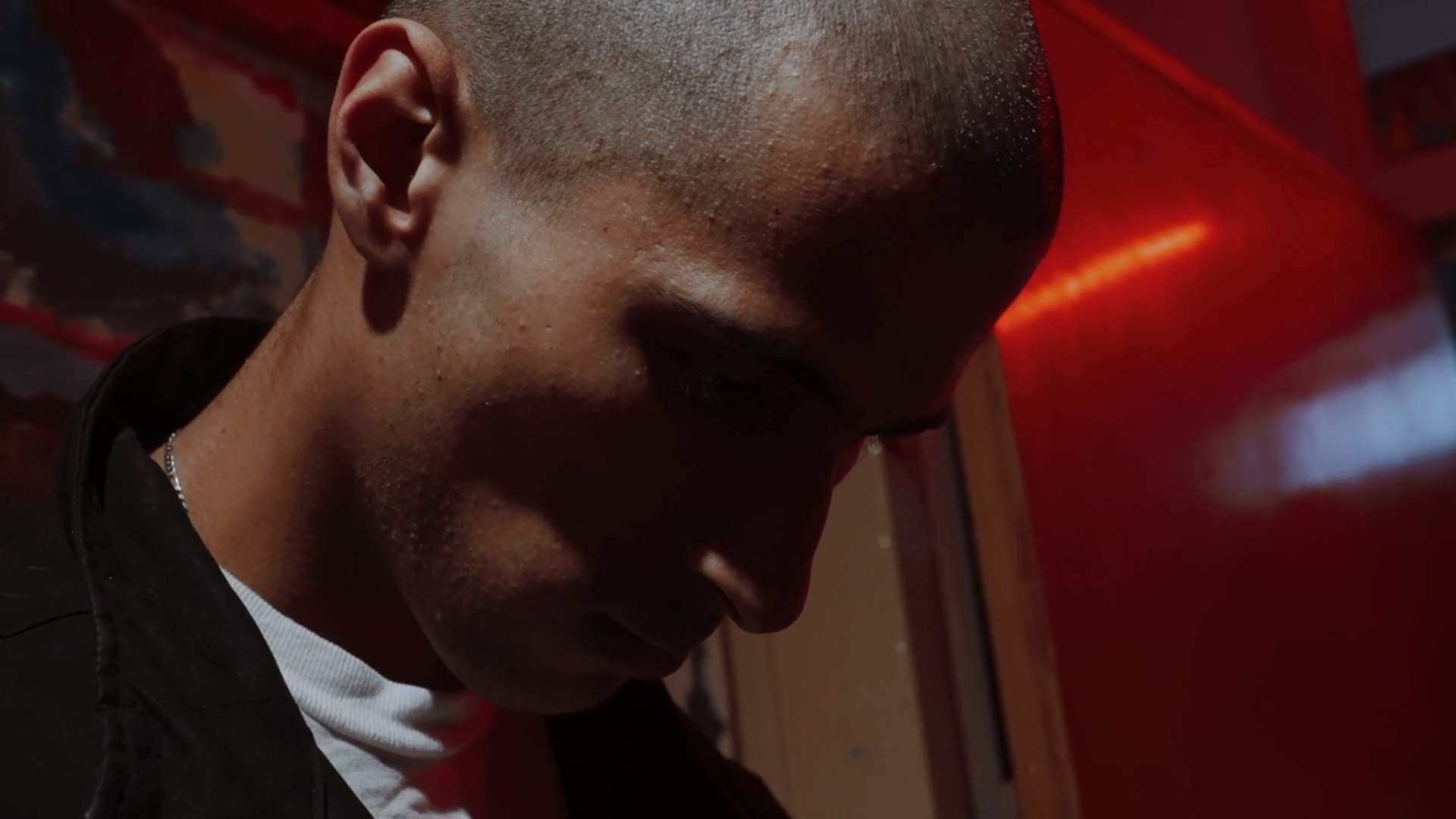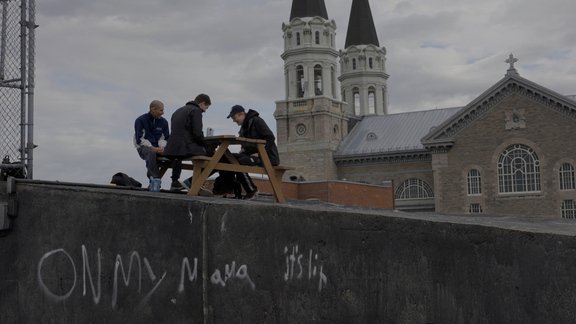Hydra
Directed by OLIVIER ROSS-PARENT
Canada, 2021
Drama, Experimental
A pathological liar puts his child in a dangerous situation.
Read our interview with Olivier below to learn more about the film.
OLIVIER ROSS-PARENT
Est. Reading Time: 7 Minutes
MARK (M) Tell us a little about yourself - when did you become interested in film and filmmaking?
OLIVIER (O) My parents were huge cinephiles, I think they saw films and storytelling as one of the best ways to teach each other about what it means to be human. I never excelled at school nor did I have an easy time making friends, but I was fascinated with stories. My love for telling stories grew in a somewhat insidious way in my teenage years as I would invent all sorts of lies and stories about myself to try and gain acceptance or respect from my peers (very similarly to the main character of my film). Luckily, there were people that cared enough about me to confront and help me accept myself as I am, so I was able to take that same love for stories and bring it to the world of theatre and later cinema. I see storytelling as one of the most powerful tools one can have in our world, but it is a dangerous one. It can shape our minds to believe or do anything.
On Casting & Directing
M I would love to discuss your approach to casting and directing actors - the lead performances are big but nevertheless compelling and feel pretty natural on screen. Please provide a little insight into your casting process - what qualities did these actors possess that made you feel confident in their ability to play the lead role?
O Casting was tricky because the main character is from a multi-ethnic background who embodies racial stereotypes (due to his lack of self-confidence and self-worth) in trying and playing the persona of a tough drug-dealing thug or loving father figure. This was most important for the actors to understand. The actors weren't going to play the stereotype of an African-American thug or of a white soft-spoken family man; they were going to play a child. A child who made bad decisions, didn’t believe in himself and was forced to grow up fast. A child who is playing a character he doesn't really understand. I needed to find actors that could relate to this frightened child and could manifest this subtle fear within their performance.
M Really interesting because your film encompasses one child character and symbolically explores the idea of children (the adult men are immature, irresponsible and lack self-worth) looking after children in a harsh environment. Please discuss the film's underlying themes about unfit parents and child welfare.
O I think there is a cyclical aspect to trauma. Things that happen in our childhood can mark us for life and lead us to inflict the pain we received unto others. It can often stump different aspects of our emotional and intellectual growth, keeping us at a child-like state in some regards. I'm sure we can all think of a moment in our lives where we saw or knew an otherwise smart adult regress to some sort of child-like behaviour as a stress response to a very difficult situation, whether through a fit of rage, pettiness, avoidance etc.
M I also think it’s interesting that we never physically see the child on screen - was this more of a practical or creative choice, or perhaps a bit of both? As I read your answers and think about your film conceptually, I can see the creative reasoning behind it.
O There was indeed a practical aspect to not having a child on screen, but the reason was twofold:
- The first was putting the audience in the skin of the child so they can viscerally feel the confusion and fear the protagonist's daughter feels from having a very unstable and untrustworthy father.
- The second was a little more abstract but it was to convey and imply what I mentioned previously about the cyclical nature of trauma. In a way, the protagonist and the child are the same person at different stages of their life. It is safe to say that our protagonist probably had a very similar upbringing to the one he is giving to his daughter. He even goes so far as to teach her how to deal with ‘nightmares’ in the same way he does in the very last scene of the film.
M As I mentioned, certain lines and moments feel really natural so I would love to know, how much freedom did you give actors to improvise during scenes? Please tell us about the evolution of the script and your collaboration with the actors in bringing it to life on screen.
O The only scene that was truly improvised is when the two thugs are on the roof chatting about smoking pot and so-and-so getting arrested. The protagonist's far-fetched monologue about hooking up with his friend's mother wasn't though and the same goes for the rest of the film. I gave room for the actors to change a few words here and there to help them express what needed to be expressed, but as each scene and most of the character's lines had a very specific purpose in my head, I didn't leave a lot of room for the actors to stir far away from the script.
M It was interesting to see actors from different backgrounds and ethnicities play the same aggressive and volatile male character. How deliberate were you in portraying toxic masculinity through the lens of different ethnicities?
O Great question. I think toxic masculinity is very often a product of low self-confidence and bad role models. I think ethnic stereotypes can also be a product of that. The protagonist in a way is based on myself and how I would have turned out if I continued to make bad decisions. I was a kid who desperately tried to fit in, a kid who looked up to the gangsters, thugs, drug dealers etc. My family was a bit of a melting pot of different cultures so I didn't feel I belonged to any particular culture. I didn't know who I was so I tried out different personalities. I mimicked people around me without thinking critically so I consequently embodied toxic masculine traits and became a bit of a walking stereotype.
The casting was very much deliberate. I cast an African-American actor to play the protagonist pretending to be a cold-blooded thug and a Caucasian actor playing the character who pretends to be a family man. These masks the protagonist wears represent his immense lack of understanding about the world around him.
‘I think there is a cyclical aspect to trauma. Things that happen in our childhood can mark us for life and lead us to inflict the pain we received unto others’
— Olivier Ross-Parent
On Inspiration
M What are some of the films and who are some of the filmmakers that inspire you, and why?
O The film that inspired the concept of the protagonist's multiple faces was a Hong Kong film called Mad Detective (2007). More generally, I've always been inspired by films that manage to make me feel what the characters feel in a very visceral and unorthodox way. Films that come to mind are:
- Mulholland Drive (2001);
- Irreversible (2002);
- The Rider (2017);
- Invasion Of The Body Snatchers (1978);
- Long Day's Journey Into Night (2018);
- Old Boy (2003); and
- the short film Gregory Go Boom (2013) by Janicza Bravo.
Mad Detective (2007) by Johnnie To & Wai Ka Kai
Mulholland Drive (2001) by David Lynch
Old Boy (2003) by Park Chan-wook
On The Future
M What are you planning to make next?
O I'm actually an actor for the most part and am working on a few fun projects I can't talk much about now, but I'm also in the process of writing my third feature-length screenplay.
Mark’s Final Thoughts
Really appreciate Olivier’s honesty and openness in discussing intricate issues, I agree with his thoughts on childhood trauma and masculinity.
I like the way Olivier subverts ethnic/racial stereotypes within the portrayal and representation of the film's protagonist. I think it demonstrates his ability to explore complex issues with respect for nuance and truth.
And I haven’t seen Mad Detective but I’m excited to catch up with it at some point - it will be interesting to watch it now that I have a rough understanding of its concept and style.
Tags Bourgeon Drama Experimental Live-action
Want to Learn More? Click here for Olivier’s insights into crafting the film’s editing style as well as exploring mental health on screen.
The founder of Hommage, Mark Shaba published this interview on 17.05.2022. Mark is a filmmaker from Victoria, Australia. He respectfully acknowledges the past and present traditional owners of the land on which he creates, promotes and screens art, the Wurundjeri people of the Kulin nation who are the custodians.
























